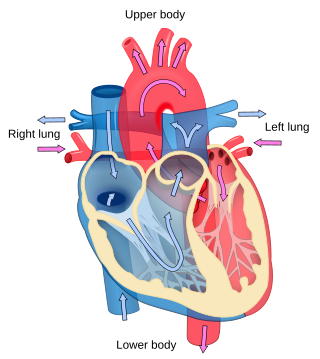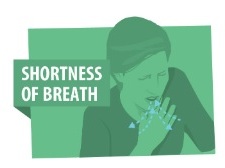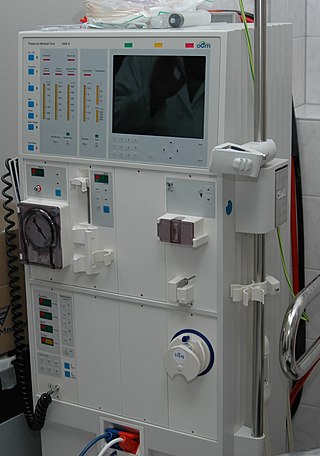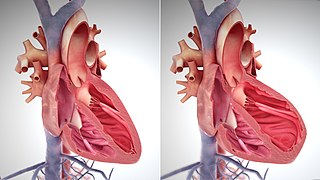
Cardiology is the study of the heart. Cardiology is a branch of medicine that deals with disorders of the heart and the cardiovascular system. The field includes medical diagnosis and treatment of congenital heart defects, coronary artery disease, heart failure, valvular heart disease, and electrophysiology. Physicians who specialize in this field of medicine are called cardiologists, a specialty of internal medicine. Pediatric cardiologists are pediatricians who specialize in cardiology. Physicians who specialize in cardiac surgery are called cardiothoracic surgeons or cardiac surgeons, a specialty of general surgery.

Stress, whether physiological, biological or psychological, is an organism's response to a stressor such as an environmental condition. Stress is the body's method of reacting to a condition such as a threat, challenge or physical and psychological barrier. There are two hormones that an individual produces during a stressful situation, well known as adrenaline and cortisol. There are two kinds of stress hormone levels. Resting (basal) cortisol levels are normal everyday quantities that are essential for standard functioning. Reactive cortisol levels are increases in cortisol in response to stressors. Stimuli that alter an organism's environment are responded to by multiple systems in the body. In humans and most mammals, the autonomic nervous system and hypothalamic-pituitary-adrenal (HPA) axis are the two major systems that respond to stress.

Shortness of breath (SOB), also medically known as dyspnea or dyspnoea, is an uncomfortable feeling of not being able to breathe well enough. The American Thoracic Society defines it as "a subjective experience of breathing discomfort that consists of qualitatively distinct sensations that vary in intensity", and recommends evaluating dyspnea by assessing the intensity of its distinct sensations, the degree of distress and discomfort involved, and its burden or impact on the patient's activities of daily living. Distinct sensations include effort/work to breathe, chest tightness or pain, and "air hunger". The tripod position is often assumed to be a sign.

Heart failure (HF), also known as congestive heart failure (CHF), is a syndrome, a group of signs and symptoms, caused by an impairment of the heart's blood pumping function. Symptoms typically include shortness of breath, excessive fatigue, and leg swelling. The shortness of breath may occur with exertion or while lying down, and may wake people up during the night. Chest pain, including angina, is not usually caused by heart failure, but may occur if the heart failure was caused by a heart attack. The severity of the heart failure is mainly decided based on ejection fraction and also measured by the severity of symptoms. Other conditions that may have symptoms similar to heart failure include obesity, kidney failure, liver disease, anemia, and thyroid disease.

Kidney failure, also known as end-stage kidney disease, is a medical condition in which the kidneys can no longer adequately filter waste products from the blood, functioning at less than 15% of normal levels. Kidney failure is classified as either acute kidney failure, which develops rapidly and may resolve; and chronic kidney failure, which develops slowly and can often be irreversible. Symptoms may include leg swelling, feeling tired, vomiting, loss of appetite, and confusion. Complications of acute and chronic failure include uremia, hyperkalaemia, and volume overload. Complications of chronic failure also include heart disease, high blood pressure, and anaemia.

Palpitations are perceived abnormalities of the heartbeat characterized by awareness of cardiac muscle contractions in the chest, which is further characterized by the hard, fast and/or irregular beatings of the heart.
Acidosis is a process causing increased acidity in the blood and other body tissues. If not further qualified, it usually refers to acidity of the blood plasma.

Hypovolemia, also known as volume depletion or volume contraction, is a state of abnormally low extracellular fluid in the body. This may be due to either a loss of both salt and water or a decrease in blood volume. Hypovolemia refers to the loss of extracellular fluid and should not be confused with dehydration.
Health psychology is the study of psychological and behavioral processes in health, illness, and healthcare. The discipline is concerned with understanding how psychological, behavioral, and cultural factors contribute to physical health and illness. Psychological factors can affect health directly. For example, chronically occurring environmental stressors affecting the hypothalamic–pituitary–adrenal axis, cumulatively, can harm health. Behavioral factors can also affect a person's health. For example, certain behaviors can, over time, harm or enhance health. Health psychologists take a biopsychosocial approach. In other words, health psychologists understand health to be the product not only of biological processes but also of psychological, behavioral, and social processes.
Type A and Type B personality hypothesis describes two contrasting personality types. In this hypothesis, personalities that are more competitive, highly organized, ambitious, impatient, highly aware of time management, or aggressive are labeled Type A, while more relaxed, "receptive", less "neurotic" and "frantic" personalities are labeled Type B.

Dobutamine is a medication used in the treatment of cardiogenic shock and severe heart failure. It may also be used in certain types of cardiac stress tests. It is given by IV only, as an injection into a vein or intraosseous as a continuous infusion. The amount of medication needs to be adjusted to the desired effect. Onset of effects is generally seen within 2 minutes. It has a half-life of two minutes. This drug is generally only administered short term, although it may be used for longer periods to relieve symptoms of heart failure in patients awaiting heart transplantation.
Allostasis (/ˌɑːloʊˈsteɪsɪs/) is a physiological mechanism of regulation in which the human body anticipates and adjusts its energy use according to environmental demands. First proposed by Peter Sterling and Joseph Eyer in 1988, the concept of allostasis shifts the focus away from the body maintaining a rigid internal set-point, as in homeostasis, to the brain's ability and role to interpret environmental stress and coordinate changes in the body using neurotransmitters, hormones, and other signaling mechanisms. Allostasis is believed to be not only involved in the body's stress response and adaptation to chronic stress; it may also have a role in the regulation of the immune system as well as in the development of chronic diseases such as hypertension and diabetes.
Classified as a "conversion disorder" by the DSM-IV, a psychogenic disease is a condition in which mental stressors cause physical symptoms matching other disorders. The manifestation of physical symptoms without biologically identifiable cause results from disruptions in normal brain function due to psychological stress. During a psychogenic episode, neuroimaging has shown that neural circuits affecting functions such as emotion, executive functioning, perception, movement, and volition are inhibited. These disruptions become strong enough to prevent the brain from voluntarily allowing certain actions. When the brain is unable to signal to the body to perform an action voluntarily, physical symptoms of a disorder arise. Examples of diseases that are deemed to be psychogenic in origin include psychogenic seizures, psychogenic polydipsia, psychogenic tremor, and psychogenic pain.

Glycocyamine is a metabolite of glycine in which the amino group has been converted into a guanidine by guanylation. In vertebrate organism it is then transformed into creatine by methylation.

Acute decompensated heart failure (ADHF) is a sudden worsening of the signs and symptoms of heart failure, which typically includes difficulty breathing (dyspnea), leg or feet swelling, and fatigue. ADHF is a common and potentially serious cause of acute respiratory distress. The condition is caused by severe congestion of multiple organs by fluid that is inadequately circulated by the failing heart. An attack of decompensation can be caused by underlying medical illness, such as myocardial infarction, an abnormal heart rhythm, infection, or thyroid disease.
Cardiorenal syndrome (CRS) is an umbrella term used in the medical field that defines disorders of the heart and kidneys whereby "acute or chronic dysfunction in one organ may induce acute or chronic dysfunction of the other". When one of these organs fails, the other may subsequently fail. The heart and the kidneys are involved in maintaining hemodynamic stability and organ perfusion through an intricate network. Patients who have renal failure first may be hard to determine if heart failure is concurrent. These two organs communicate with one another through a variety of pathways in an interdependent relationship. In a 2004 report from the National Heart, Lung and Blood Institute, CRS was defined as a condition where treatment of congestive heart failure is limited by decline in kidney function. This definition has since been challenged repeatedly but there still remains little consensus over a universally accepted definition for CRS. At a consensus conference of the Acute Dialysis Quality Initiative (ADQI), the CRS was classified into five subtypes primarily based upon the organ that initiated the insult as well as the acuity of disease.
Cardiac psychology is a specialization of health psychology that focuses on the primary and secondary prevention of heart disease by incorporating strategies to address the emotional and behavioral barriers to lifestyle changes, and that seeks to enhance recovery in cardiac patients by means of providing patients tools to cope with life and physical changes associated with their disease. Cardiac psychologists can help cardiac patients across the lifespan: prevention, pre-surgery, post-surgery, and rehabilitation of cardiac disease with a particular emphasis on achieving optimal quality of life outcomes. Cardiac psychology includes both research and clinical practice aspects.

In psychology, stress is a feeling of emotional strain and pressure. Stress is a type of psychological pain. Small amounts of stress may be beneficial, as it can improve athletic performance, motivation and reaction to the environment,Excessive amounts of stress, however, can increase the risk of strokes, heart attacks, ulcers, and mental illnesses such as depression and also aggravation of a pre-existing condition.

Fitness to dive, specifically the medical fitness to dive, is the medical and physical suitability of a diver to function safely in the underwater environment using underwater diving equipment and procedures. Depending on the circumstances it may be established by a signed statement by the diver that they do not have any of the listed disqualifying conditions and is able to manage the ordinary physical requirements of diving, to a detailed medical examination by a physician registered as a medical examiner of divers following a procedural checklist, and a legal document of fitness to dive issued by the medical examiner.

The main pathophysiology of heart failure is a reduction in the efficiency of the heart muscle, through damage or overloading. As such, it can be caused by a wide number of conditions, including myocardial infarction, hypertension and cardiac amyloidosis. Over time these increases in workload will produce changes to the heart itself:












